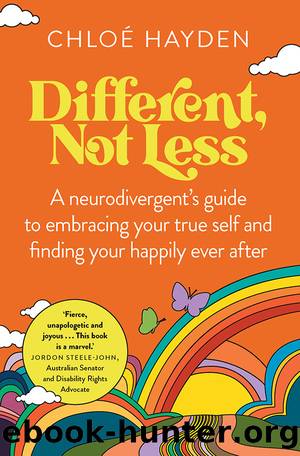Different, Not Less by Chloé Hayden

Author:Chloé Hayden [Hayden Chloé]
Language: eng
Format: epub
Publisher: Allen & Unwin
Published: 2022-07-27T00:00:00+00:00
AUTISM TRAITS NOT SPOKEN ABOUT
The following traits, while common in autistic people, often go unspoken about or unnoticed. They may not be listed as specific criteria in the DSM-5 (released in 2013) but are backed up by multiple experts and research.
Sleep problems
Insomnia affects between 73 and 80 per cent of autistic individuals, and studies suggest that autistic people only spend 15 per cent of their sleep in the critical REM stage compared with around 23 per cent for neurotypical people. While we donât know the specific link between autism and sleep issues, two potential causes are sensory sensitivities and a lack of natural melatonin in our brains.
Poor and abnormal posture
Many autistic people have poor posture due to a reduced self-perception of body movement and lack of motor skills.
Different or âoddâ gait
Many autistic people have an unusual way of walking. It might be walking pigeon-toed, walking on our toes (often due to sensory issues), walking on the insides of our feet, or even having an incredibly quick walking speed. Again, this may be linked to poor perception of body movement and poor motor skills. These types of gaits may become heightened during extreme sensory sensitivity.
Connection with animals
As other humans often seem like a strange, unsettling, bizarre species to autistic people, we may find the most comfort with animals. Itâs no secret that the impact animals have on us can be healing and can help us to understand how to communicate. Animals donât mock, they donât pretend, they donât have hidden agendas. That sort of thing is exactly what we need ⦠itâs what everyone needs.
Clumsiness
Autistic people can be unaware of their surroundings and are often covered in bruises. This is due to a lack of spatial awareness and poor fine-motor skills, and possibly dyspraxia, a neurological condition that is extremely common in autism. It means our hands, eyes and brains often donât link up, leaving us to be very clumsy!
Seemingly unnecessary rituals
Many of us on the spectrum have rituals that may seem odd to neurotypical viewers, appearing unnecessary and illogical (such as drinking only from a specific cup, or asking the same questions and needing a specific answer, or keeping objects in the exact same place, or playing the same way without change). But these rituals are often simply there to make us feel safe, comfortable and grounded (well and truly enough of a reason). Due to this ritualism, many autistic kids may receive a misdiagnosis of obsessive-compulsive disorder (OCD). While those who are autistic are thirteen times more likely to be diagnosed with OCD (6 per cent), there are many OCD traits that are also autism traits, without the comorbid diagnosis.
Intense compassion and empathy
Thereâs a large expectation that autistic people inherently lack empathy and compassion. This couldnât be further from the truth and is often entirely backwards. Autistic people are some of the most compassionate, empathetic, sensitive people in the world, and can experience these emotions so deeply that they become extremely painful and overwhelming. Due to these heightened, often
Download
This site does not store any files on its server. We only index and link to content provided by other sites. Please contact the content providers to delete copyright contents if any and email us, we'll remove relevant links or contents immediately.
Down the Drain by Julia Fox(963)
The Light We Carry by Michelle Obama(879)
Cher by Cher(788)
Simple Passion by Annie Ernaux(735)
Love, Pamela by Pamela Anderson(594)
Zen Under Fire by Marianne Elliott(556)
The Nazis Knew My Name by Magda Hellinger & Maya Lee(540)
You're That Bitch by Bretman Rock(540)
Novelist as a Vocation by Haruki Murakami(530)
The Foxfire Book of Appalachian Women by Kami Ahrens(518)
Alone Together: Sailing Solo to Hawaii and Beyond by Christian Williams(517)
Kamala Harris by Chidanand Rajghatta(490)
Gambling Man by Lionel Barber(472)
The Barn by Wright Thompson(429)
Drinking Games by Sarah Levy(416)
Limitless by Mallory Weggemann(409)
A Renaissance of Our Own by Rachel E. Cargle(405)
Memoirs of an Indian Woman by Shudha Mazumdar Geraldine Hancock Forbes(403)
A new method to evaluate the dose-effect relationship of a TCM formula Gegen Qinlian Decoction: âFocusâ mode of integrated biomarkers by unknow(396)
